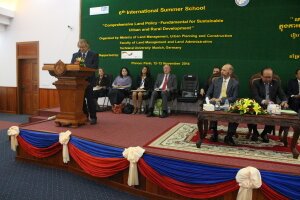 12-13 November 2014
12-13 November 2014
PHNOM PENH – The 6th International Summer School, Comprehensive Land Policy – Fundamental for Sustainable Urban and Rural Development was held by the Ministry of Land Management, Urban Planning and Construction (MLMUPC), jointly organized with the Royal University of Agriculture (RUA), and the Technical University Munich (TUM), in partnership with GIZ.
The summer school reached an unprecedented scale, attracting about 360 participants with representatives from Bangladesh, Cambodia, China, Germany, Lao PDR, Nepal, the Philippines, Serbia, Thailand and Vietnam. Aiming for balanced perspectives, speakers included local and international NGOs, Cambodian and German academe, government representatives of Cambodia and the region, and bilateral and multilateral development organisations.
After a well-received welcome speech by the German Ambassador to Cambodia, H.E. Baron Marschall von Bieberstein on the land reform, senior minister H.E. Im Chhun Lim, opened the summer school, pointing out, among many other aspects, the comprehensive character of the national land policy.
The summer school was structured into different themes:
- Relevance of Land Policy in the Global and International Context: Addressed inputs on sustainable development goals (SDGs), Global Land Indicator Initiative, Voluntary Guidelines on the Responsible Governance of Tenure (VGGT) and on land policy efforts in other countries in the region. While land policy has to address the needs of all, marginalized or vulnerable groups require explicit and targeted consideration.
- Land Policy and Marginalized Groups: Discussed housing rights of the urban poor, indigenous land rights as well as gender-sensitive land policy, with inputs of representatives from UN Women, the Cambodia Indigenous Youth Association (CIYA), the Asian Coalition for Housing Rights (ACHR) and government.
- Cross-Cutting Topics of Land Policy: Presented concepts of ecosystem services and impacts of economic corridor development. Different perspectives on the Cambodian White Paper on Land Policy and its implementation complemented the themes addressed.
H.E. Dr. Holger Magel summarized key messages from the summer school in his closing speech, including an acknowledgment of the comprehensiveness of the White Paper on Land Policy, its quality in an international context and the political signals of commitment to its objectives. Likewise, he emphasized the need to focus on implementation and its review and evaluation, on participation, information, capacity development and cooperation – all key means for achieving an implementation that lives up to the spirit of the policy: a sustainable rural-urban development between production and protection.
For further information, all presentations is available: https://giz-cambodia.com/6th International Summer School 2014

